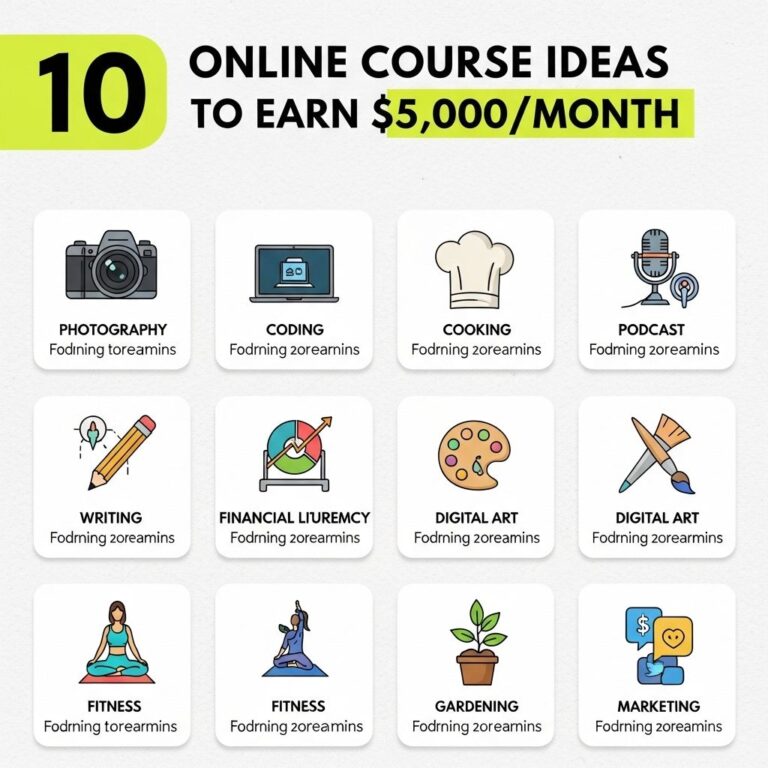In the ever-evolving landscape of online education, creating a profitable online course can be both a rewarding and challenging endeavor. With the rise of e-learning platforms and the increasing demand for skill development, entrepreneurs and educators alike are keen to leverage technology to share their knowledge. However, the key to a successful online course lies not only in its content but also in the tools used to create, market, and deliver it. This article explores some of the top tools available for building and managing profitable online courses, providing insights on how to effectively utilize them to maximize your success.
Table of Contents
Choosing the Right Course Creation Platform
The foundation of your online course is the platform you choose to host it. A good course creation platform should offer user-friendly design, robust features, and flexibility. Here are some of the leading options:
- Teachable: An all-in-one platform that allows you to create, host, and sell your courses. It offers customization options, integrations with marketing tools, and analytics to track your progress.
- Thinkific: Similar to Teachable, Thinkific provides course creation tools, marketing features, and analytics. Its drag-and-drop builder makes it easy to design courses without technical skills.
- Udemy: A marketplace for online courses that allows you to reach a large audience quickly, although it takes a percentage of your sales.
- Kajabi: This platform goes beyond course creation, offering tools for building websites, blogs, and email marketing, making it an excellent choice for those looking to build a brand.
Content Creation Tools
Once you’ve chosen your platform, it’s time to focus on creating high-quality content. Here are some essential tools that can enhance your course materials:
Video and Audio Production
High-quality video and audio are crucial for engaging your learners. Here are some tools to consider:
- OBS Studio: A free and open-source software for video recording and live streaming. It’s great for creating lecture videos and tutorials.
- Camtasia: A powerful screen recording and video editing software that allows you to create professional-looking videos easily.
- Audacity: A free, open-source audio editing software that is perfect for recording and editing podcasts or voiceovers.
Graphic Design
Visuals enhance the learning experience. Here are some design tools to help:
- Canva: A user-friendly graphic design tool with templates for presentations, social media posts, and course materials.
- Adobe Spark: A simple way to create visually appealing graphics, web pages, and videos with ease.
Marketing Your Online Course
Creating your course is only half the battle; marketing it effectively is essential for profitability. Here are some powerful marketing tools:
Email Marketing
Email marketing is still one of the best ways to reach your audience. Consider using:
- Mailchimp: A popular email marketing platform with automation features and customizable templates.
- ConvertKit: Designed specifically for creators, it offers advanced automation and segmentation features.
Social Media Marketing
Social media is a powerful tool for promoting your course. Consider these platforms:
- Buffer: A social media management tool that lets you schedule posts, analyze performance, and manage multiple accounts.
- Hootsuite: Another social media management platform that offers robust analytics and scheduling features.
Engaging Your Students
Maintaining student engagement is crucial for the success of your online course. Here are some tools to facilitate this:
Community Building
Creating a sense of community can significantly enhance student engagement. Here are a couple of tools:
- Slack: A messaging platform that can be used to create dedicated channels for discussions, feedback, and support.
- Facebook Groups: A free option to build a community around your course, allowing for interaction and peer support.
Interactive Elements
Incorporating quizzes, polls, and discussions can enrich the learning experience:
- Typeform: An online tool for creating interactive quizzes and surveys that can enhance engagement.
- Kahoot: A game-based learning platform that allows you to create quizzes to make learning fun.
Analyzing Performance
To ensure your course is profitable, it’s crucial to analyze its performance regularly. Here are some tools to help you keep track:
Analytics Tools
Understanding your audience’s behavior can help you optimize your course:
- Google Analytics: A powerful tool that provides insights into your course sales, traffic, and user behavior.
- Hotjar: Offers heatmaps and session recordings to understand how users interact with your course content.
Pricing Strategies
Setting the right price for your course is critical. Here are some strategies to consider:
Price Models
Choose a pricing model that reflects the value of your course:
- One-time payment: A straightforward model where students pay once for lifetime access.
- Subscription model: Students pay a recurring fee for access to course materials and updates.
- Tiered pricing: Offer multiple levels of access (e.g., basic, premium) with varying features.
Discount Strategies
Attract more students with strategic discounting:
- Early bird discounts for the first cohort of students.
- Seasonal promotions during holidays.
- Bundle offers with additional resources or courses.
Conclusion
Creating a profitable online course involves more than just sharing your knowledge; it requires a strategic approach to content creation, marketing, student engagement, and performance analysis. By leveraging the right tools, you can streamline your process, enhance the learning experience, and ultimately increase your course’s profitability. Whether you’re just starting or looking to optimize an existing course, the tools mentioned in this article provide a solid foundation for success in the online education market.
FAQ
What are the best platforms for creating online courses?
Some of the best platforms for creating online courses include Teachable, Thinkific, Kajabi, and Udemy, each offering unique features for course creation and management.
How can I market my online course effectively?
To market your online course effectively, utilize social media, email marketing, content marketing, and partnerships with influencers in your niche.
What tools can I use to create high-quality video content for my course?
Tools like Camtasia, Adobe Premiere Pro, and ScreenFlow are popular for creating high-quality video content for online courses.
Is it necessary to have a website for my online course?
While it’s not strictly necessary, having a website can enhance your course’s visibility, credibility, and provide a platform for additional content and resources.
What should I include in my online course curriculum?
Your online course curriculum should include clear learning objectives, engaging content, assessments, and resources that facilitate student understanding and engagement.









